Intelligence & Espionage
Beginner
The Weaponisation of Everything
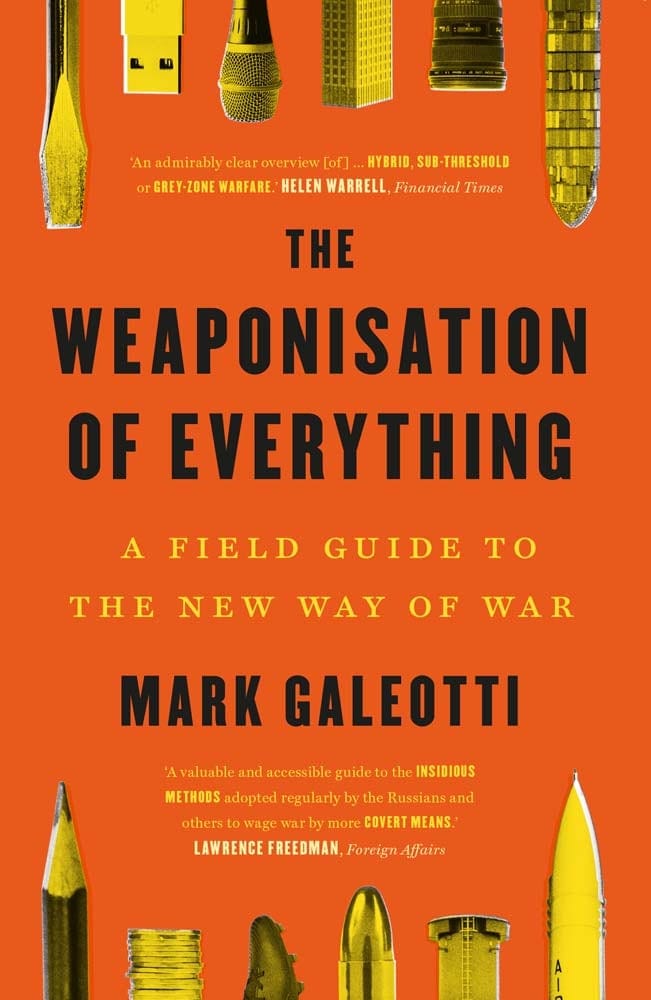
"The Weaponisation of Everything" explores how traditional ideas of warfare have blurred, with states and non-state actors alike leveraging all aspects of society - technology, information, and economy - to gain strategic advantage.
This book isn't strictly focused on Russia, but Russia does all the things mentioned in the book. Russia weaponizes tools like social media, trade, and even culture to destabilize opponents without ever firing a shot .. or at least without ever firing more than a few targeted shots.
The book illuminates a new era of competition and conflict, where the lines between war and peace are increasingly indistinct. If you are looking to understand modern security dynamics and the covert ways in which power is exercised, with the ultimate goal of applying that knowledge to Russian affairs, this book is 10/10.
Inside the Aquarium: The Making of a Top Soviet Spy
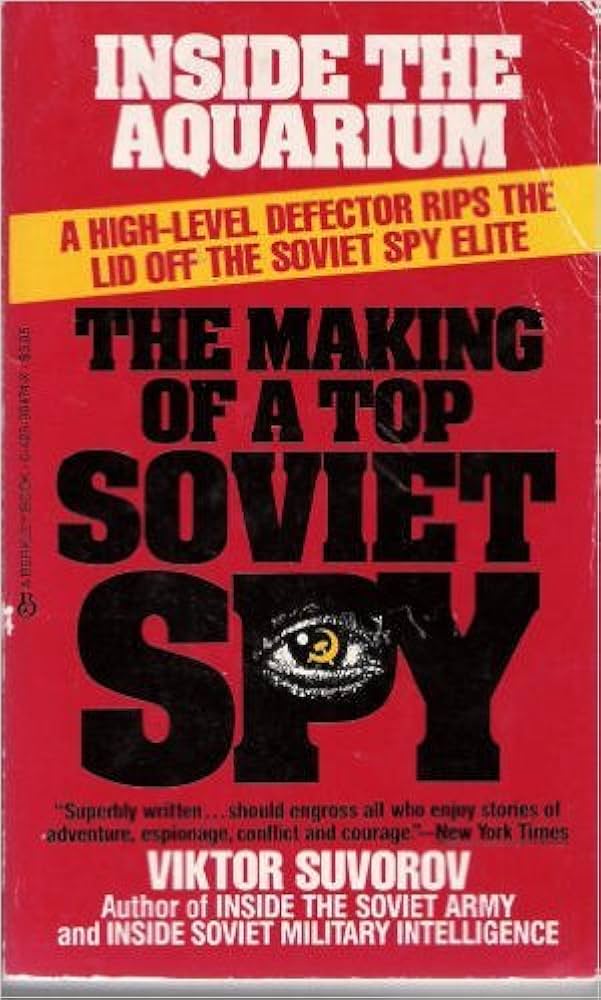
Viktor Suvorov used to be an officer for Soviet military intelligence, GRU, before he defected to the West. This autobiographical account provides an inside look at the secretive GRU.
The writing is engaging and fast-paced, which makes this book accessible for people new to intelligence history. The personal, narrative-driven approach enables readers to immerse themselves in the world of Soviet espionage - but always keep in mind that this isn't an academic book, it's a very personal story that may or may not be transfigured in order to make the author look better.
KGB: The Inside Story
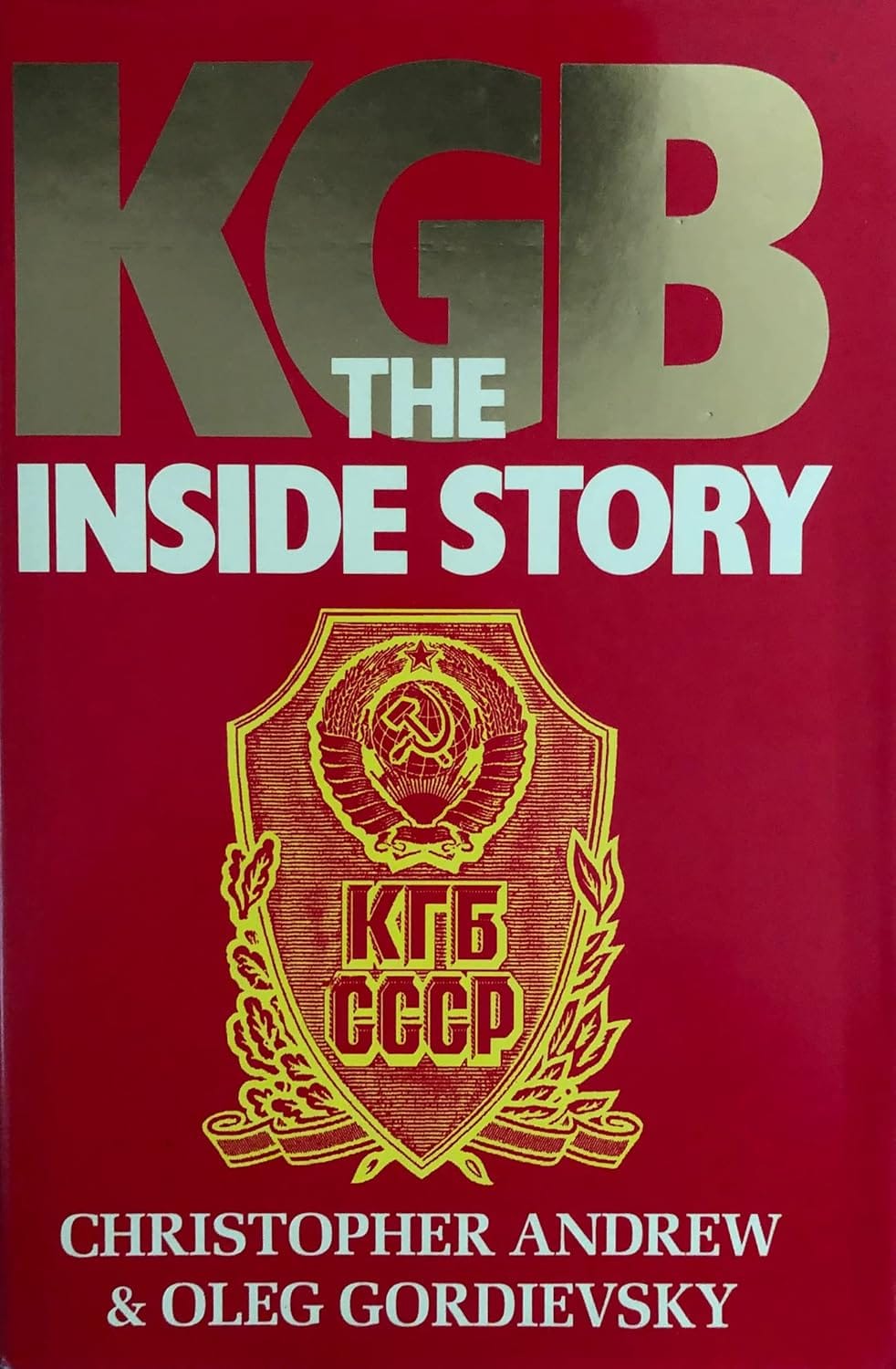
This book provides a history of the Soviet Union’s main intelligence agency, based on classified documents and firsthand accounts from Oleg Gordievsky, a high-ranking KGB defector.
The book covers the origins of the KGB, its influence over Soviet politics, its role in Cold War espionage, and its methods of surveillance and counterintelligence. It also provides insights into major KGB operations, including spy cases in the West.
Despite its detailed content, the book is written in a clear and accessible style. It provides a lot of impulses for further research, thus being a good introduction into the subject.
Comrade J: The Untold Secrets of Russia’s Master Spy in America After the End of the Cold War *
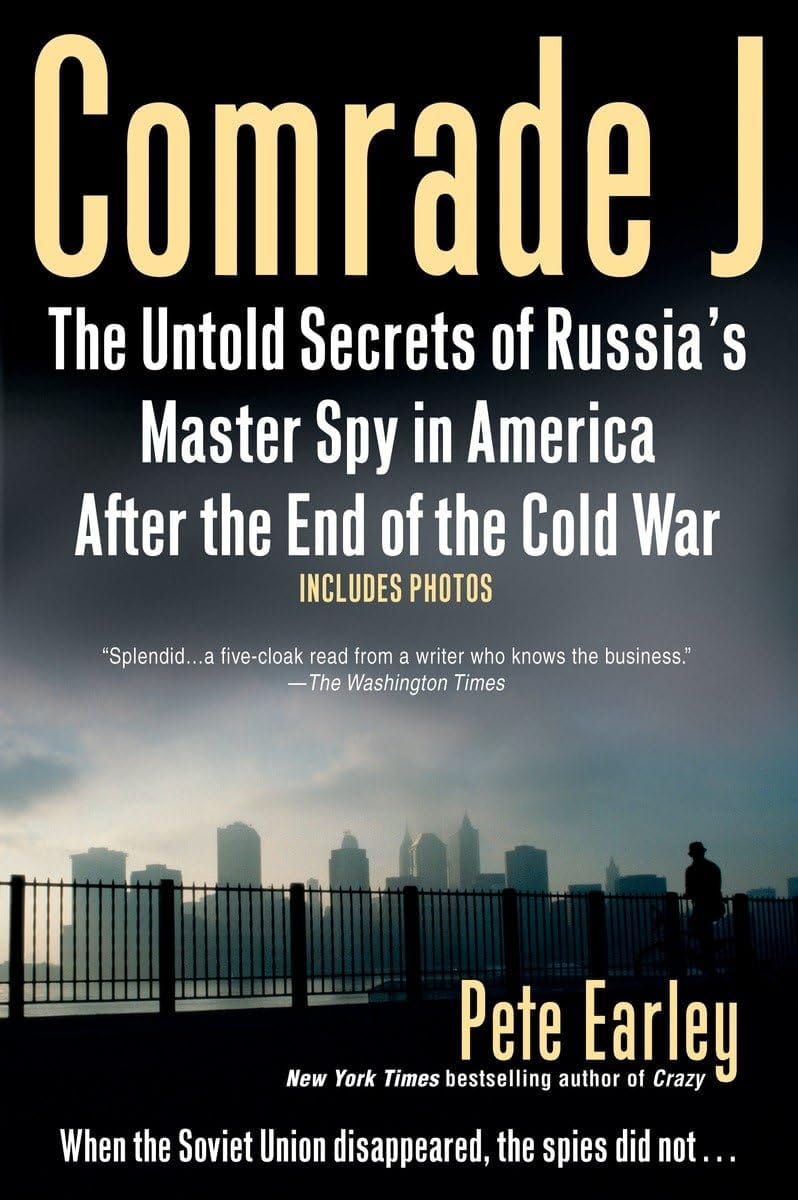
This book tells the story of Sergei Tretyakov, a Russian spy who defected to the United States in 2000. Tretyakov worked for Russia’s intelligence service (SVR) while stationed at the United Nations in New York, where he carried out espionage operations long after the Cold War had officially ended. The book reveals modern Russian intelligence tactics, how spies operate in the West, and Tretyakov’s reasons for defecting.
The book provides insight into modern Russian intelligence activities without requiring an understanding of Cold War history, which makes it accessible for beginners.
Spymaster: My Thirty-two Years in Intelligence and Espionage Against the West
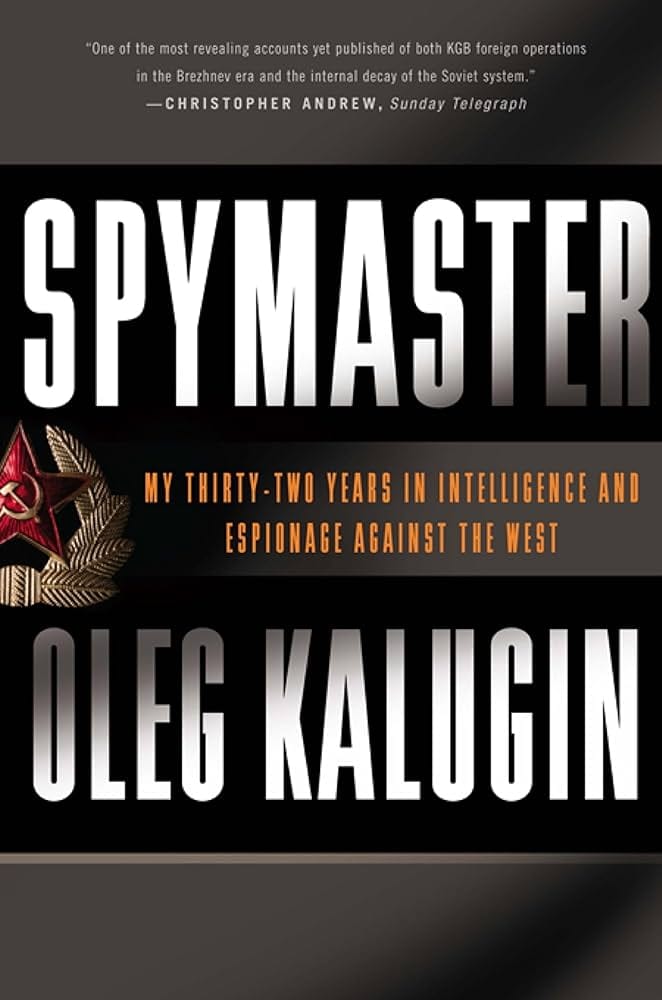
Spymaster is the memoir of Oleg Kalugin, a former KGB general who became one of the agency’s top intelligence officers before turning against the Soviet system. Kalugin recounts his career, from infiltrating Western institutions to running covert operations and counterintelligence missions. He also details his eventual disillusionment with the KGB and his shift toward exposing its activities.
The book provides a firsthand account of KGB operations while at the same time offering insights into the political and moral dilemmas faced by members of the KGB. The author doesn't spare himself either, being critical of a lot of things that he has done.
The New Nobility: The Restoration of Russia’s Security State and the Enduring Legacy of the KGB
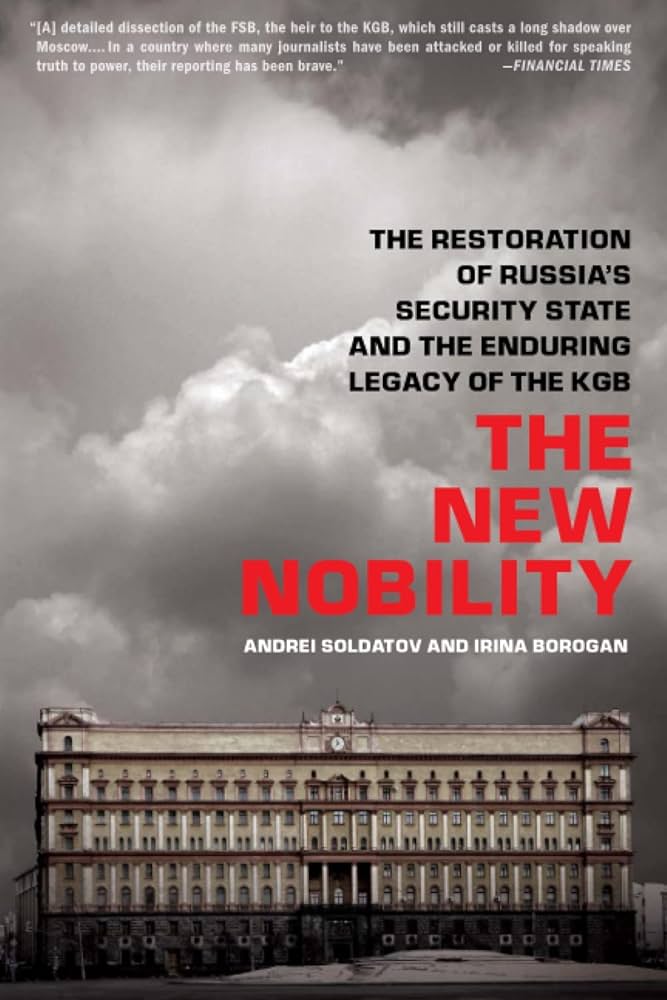
This book explores how Russia’s intelligence agencies, particularly the FSB, have regained immense power under Vladimir Putin. The authors investigate how former KGB officers have risen to top positions in Russia’s government, business, and security services, creating an elite ruling class - what they call the "new nobility." The book details the FSB’s involvement in suppressing political opposition, controlling the media, and expanding Russia’s surveillance state.
While the book covers complex political issues, it does so in a way that does not require deep prior knowledge of history or Russian politics. The journalistic style of writing makes it easy to follow.
The Sword and the Shield: The Mitrokhin Archive and the Secret History of the KGB
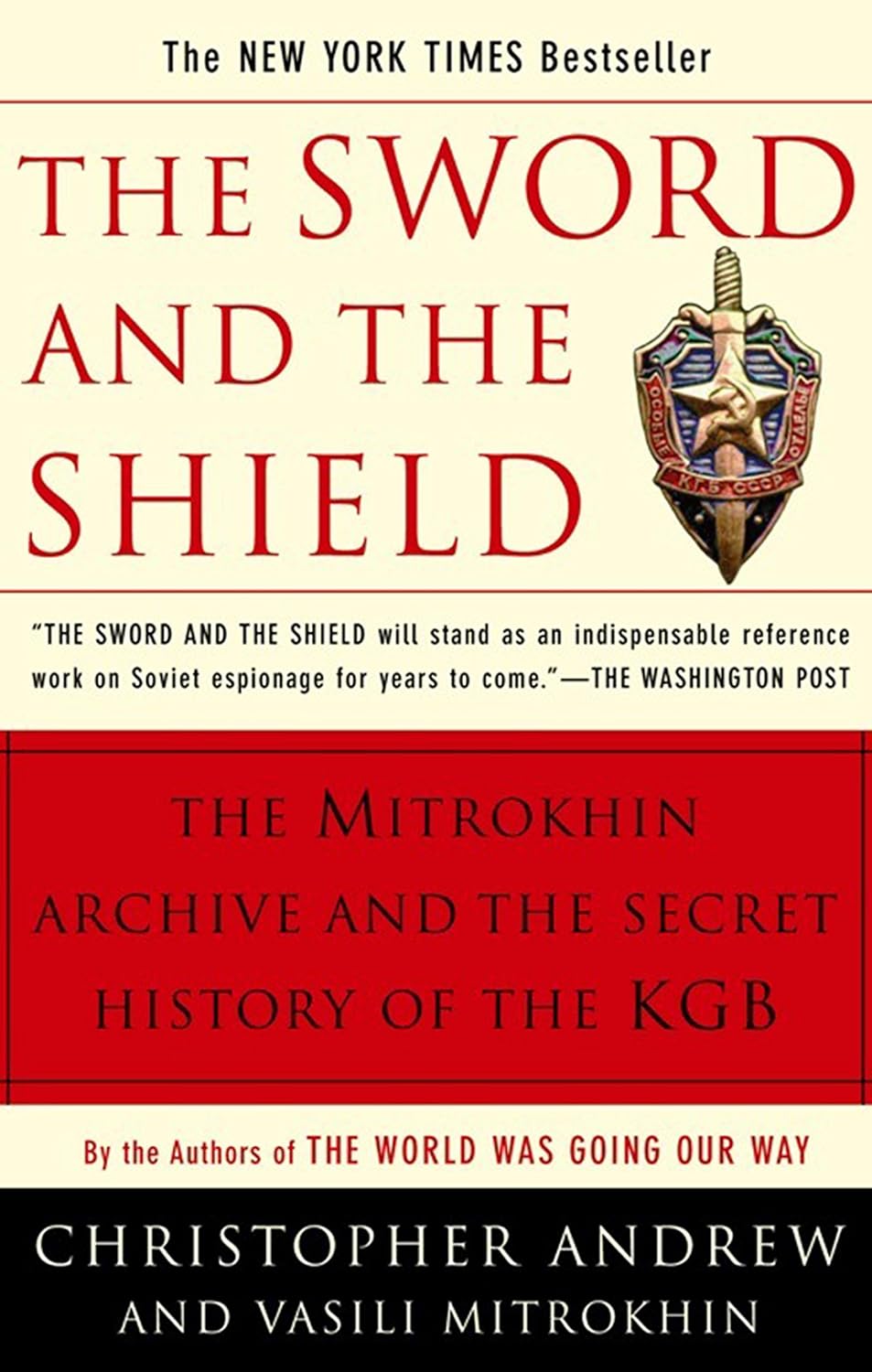
This book is based on the Mitrokhin Archive, a collection of secret KGB files smuggled out of the Soviet Union by defector Vasili Mitrokhin. It provides a detailed history of KGB operations, including espionage activities in the West, Soviet intelligence strategies, and covert influence campaigns during the Cold War.
Christopher Andrew contextualizes the documents, revealing how the KGB targeted Western governments, infiltrated institutions, and conducted disinformation campaigns.
Special Tasks: The Memoirs of an Unwanted Witness—A Soviet Spymaster
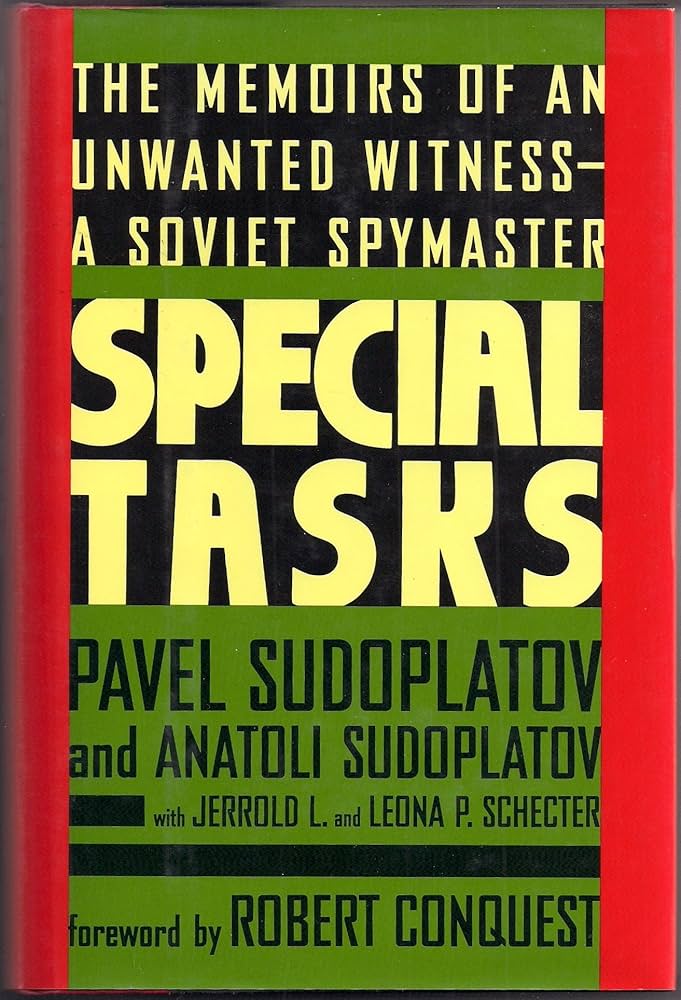
This memoir by former Soviet intelligence officer Pavel Sudoplatov offers a firsthand account of some of the most secretive and controversial operations of the Stalin era.
Sudoplatov, who was involved in assassinations, nuclear espionage, and counterintelligence, provides insights into Soviet spy networks, the inner workings of the NKVD, and Stalin’s ruthless intelligence strategies.
While it (obviously) covers serious topics, it does not require extensive prior knowledge, making it a great entry point into Cold War espionage and Stalinist-era intelligence operations.
Intermediate
The Secret History of Soviet Russia's Police State

Most books about secret services in the Soviet Union talk about the more visible forms of violence and state repression. This book instead focuses on the complex reality of the Soviet police system. The author arguing that, even though repression and state violence were central to the regime's power, loyalty (in the widest sense of the word) was also ensured through appeals to ideology, social benefits, and a sense of shared purpose.
This comparatively unconventional approach / explanation provides an interesting counterweight to other theories and ultimately helps with understanding the daily reality in both the Soviet Union and the Russian Federation.
From Russia with Blood: Putin’s Ruthless Killing Campaign and Secret War on the West
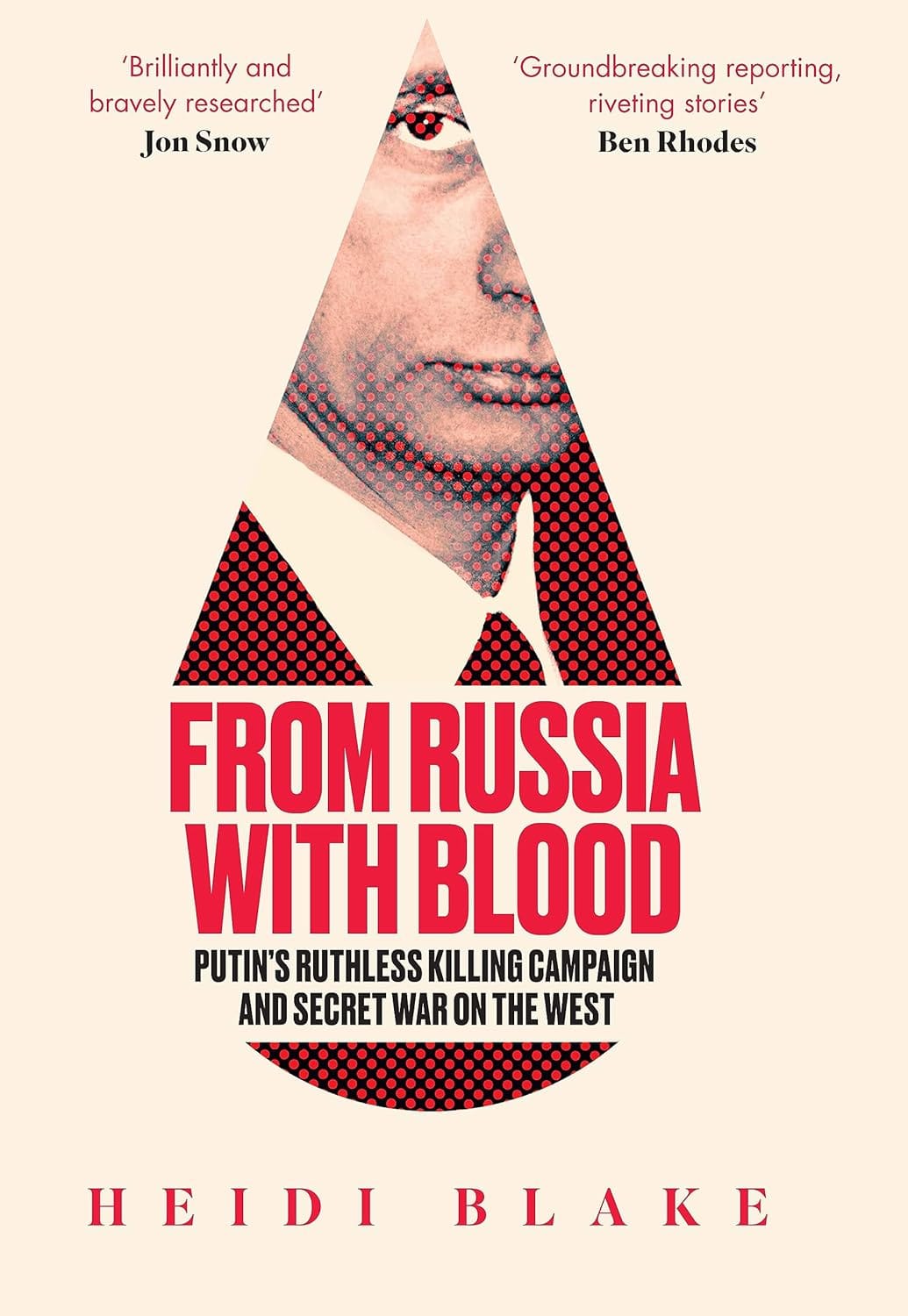
This book investigates a series of politically motivated assassinations carried out by Russian operatives on foreign soil, particularly in the UK.
Heidi Blake uncovers how the Russian government has targeted defectors, dissidents, and critics, using poisonings, assassinations, and covert operations. She details cases like the poisoning of Alexander Litvinenko, the attempted murder of Sergei Skripal, and other suspicious deaths linked to the Kremlin, revealing how Western governments have been unable to respond.
The book isn't difficult to read, but unless you have a baseline understanding of Russian intelligence and Russian politics you're going to confronted by a lot of unfamiliar names and acronyms.
Killer in the Kremlin: The Explosive Account of Putin's Reign of Terror
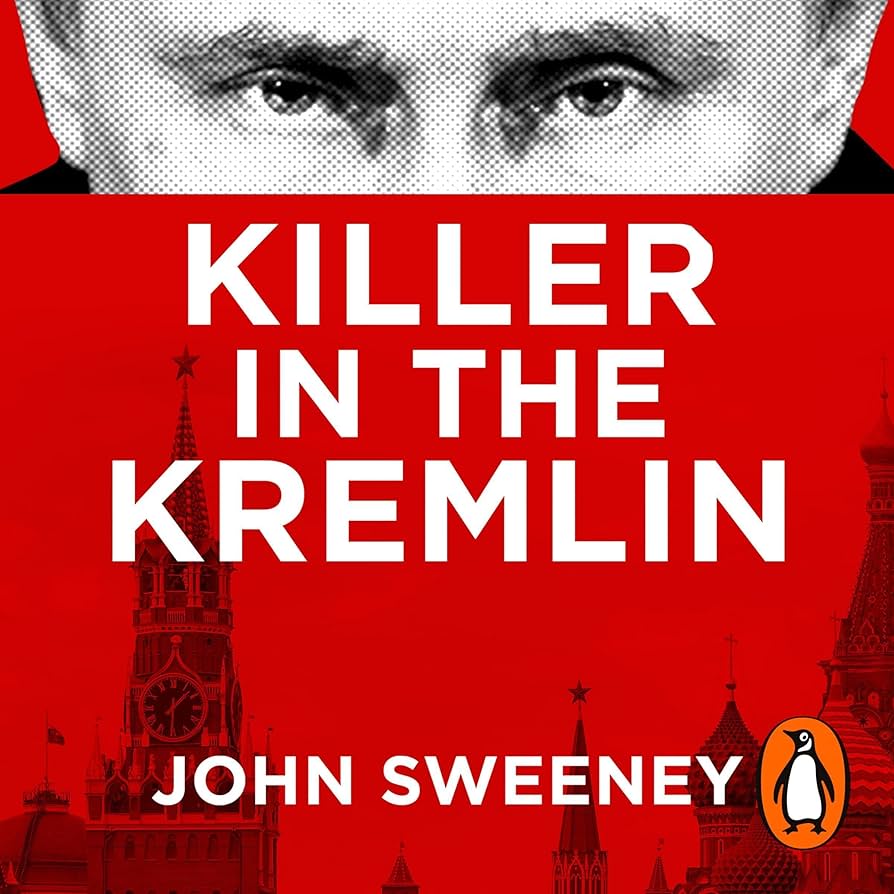
In Killer in the Kremlin, journalist John Sweeney presents a provocative account of Vladimir Putin’s rise to power and the ruthless tactics he has used to maintain control - and I mean provocative, he doorstepped Vladimir Putin while nursing a brutal hangover, nearly vomiting all over the Russian president.
The book explores Putin’s early career in the KGB, his involvement in Chechnya, and the brutal methods employed against political opponents, journalists, and dissidents.
Similar to "From Russia With Blood" this book isn't difficult to read, but unless you have a baseline understanding of Russian intelligence and Russian politics you're going to confronted by a lot of unfamiliar names and acronyms.
The Rodchenkov Affair: How I Brought Down Russia’s Secret Doping Empire
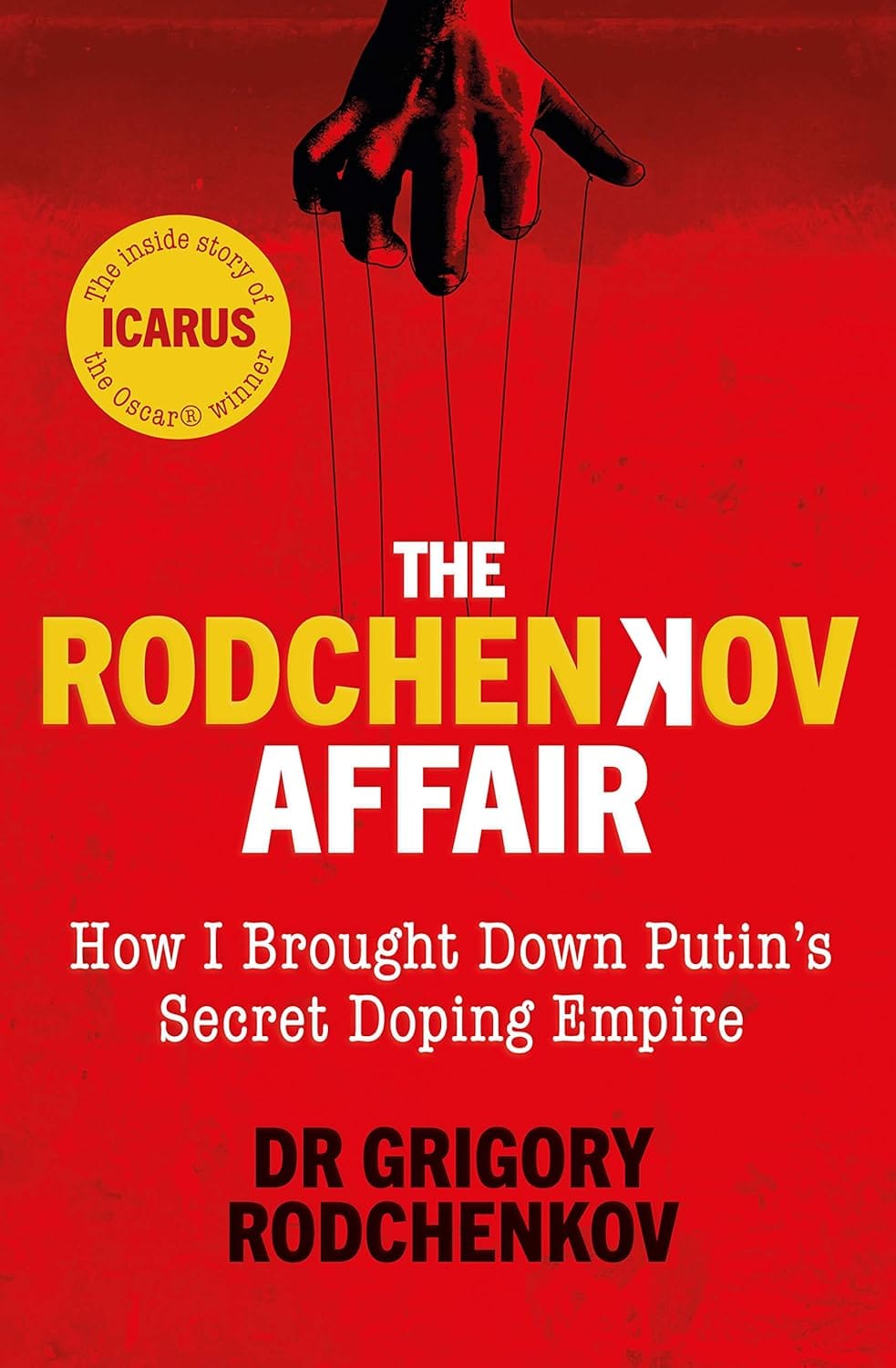
This book takes a close, personal look at the massive state-sponsored doping scandal that led to Russia’s ban from international sports. The author, Grigory Rodchenkov, is the former head of Russia’s anti-doping lab.
He provides an insider’s perspective on how the Russian government systematically cheated in Olympic competitions, the role of intelligence services in covering up the fraud, and his eventual defection to the U.S. after exposing the truth. The book also reveals the risks and threats he faced for whistleblowing.
On its own it's an interesting look at a single scandal, but if you approach the book with a basic understanding of internal Russian politics and Russia's history of state control some of the events described in it can be understood as symptoms rather then a root cause
Putin’s People: How the KGB Took Back Russia and Then Took On the West
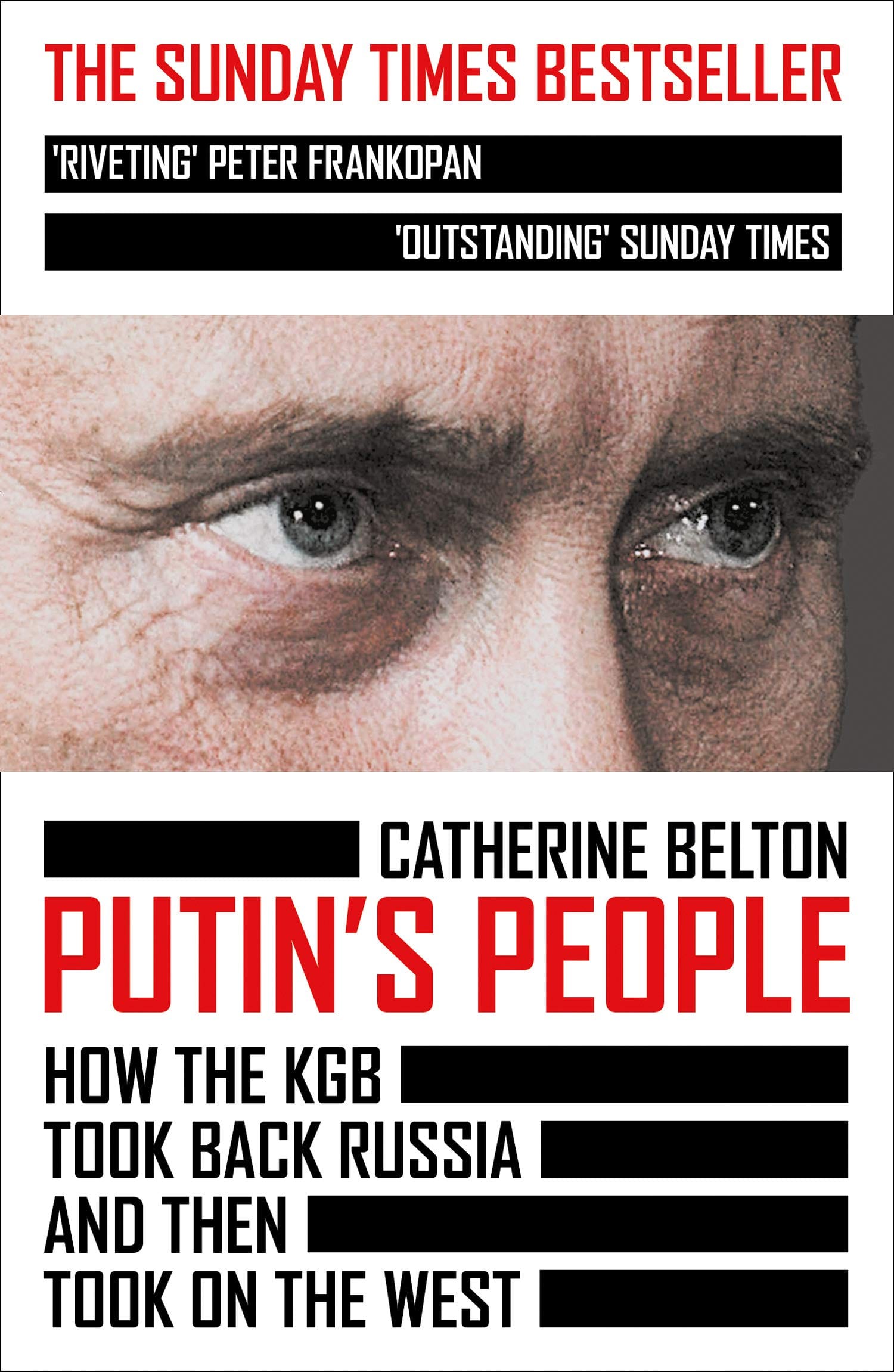
This book traces how Vladimir Putin and his close network of ex-KGB agents consolidated control over Russia’s political and economic landscape.
Drawing on deep research and extensive interviews, Belton reveals how power shifted from the chaotic post-Soviet oligarchy to a tight-knit circle loyal to the Kremlin, ultimately extending its influence far beyond Russia’s borders.
By highlighting covert financial networks, strategic manipulation, and the Kremlin’s ties to Western institutions, this book offers an illuminating look at the forces shaping modern Russian power. I wish that the book would have been written much earlier, because there are very few books that provide a similar level of understanding of Russia's resurgence and the broader global implications of Russia under Vladimir Putin.
Russia's War on Everybody - And What It Means For You
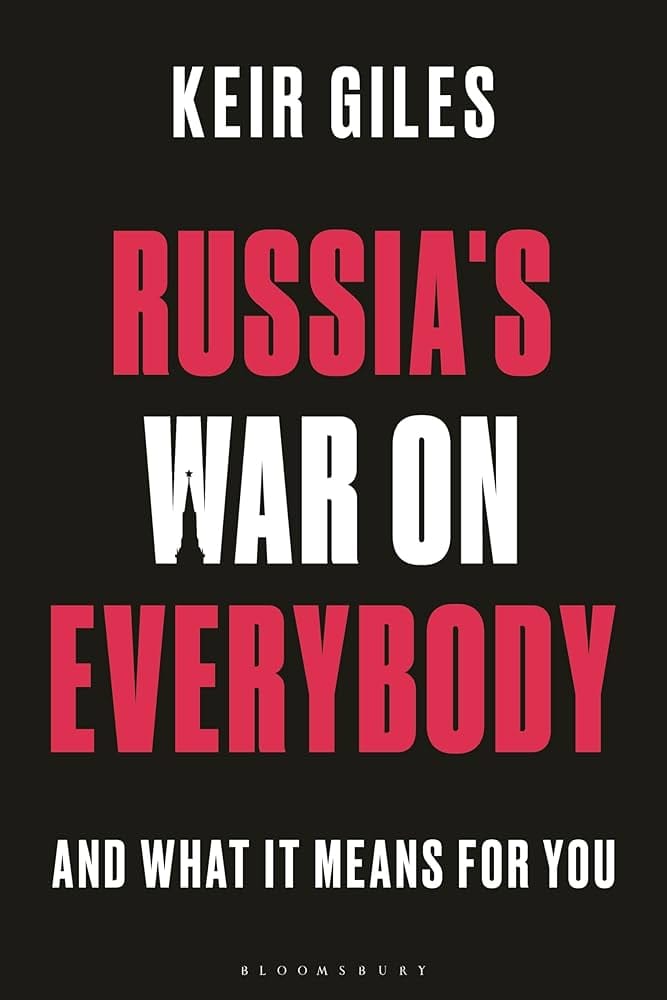
This book takes a look at the broad and evolving strategies Moscow uses to undermine, destabilize, and exert influence beyond its borders. From cyberattacks and disinformation campaigns to energy politics and espionage, the author reveals how these tactics don't just target governments, but threaten ordinary people like you and me.
I recommend this book in order to further ones understanding of the scope of Russian influence operations as well as the motives behind them and the tools employed by the malicious actors.
Spies: The Rise and Fall of the KGB in America *
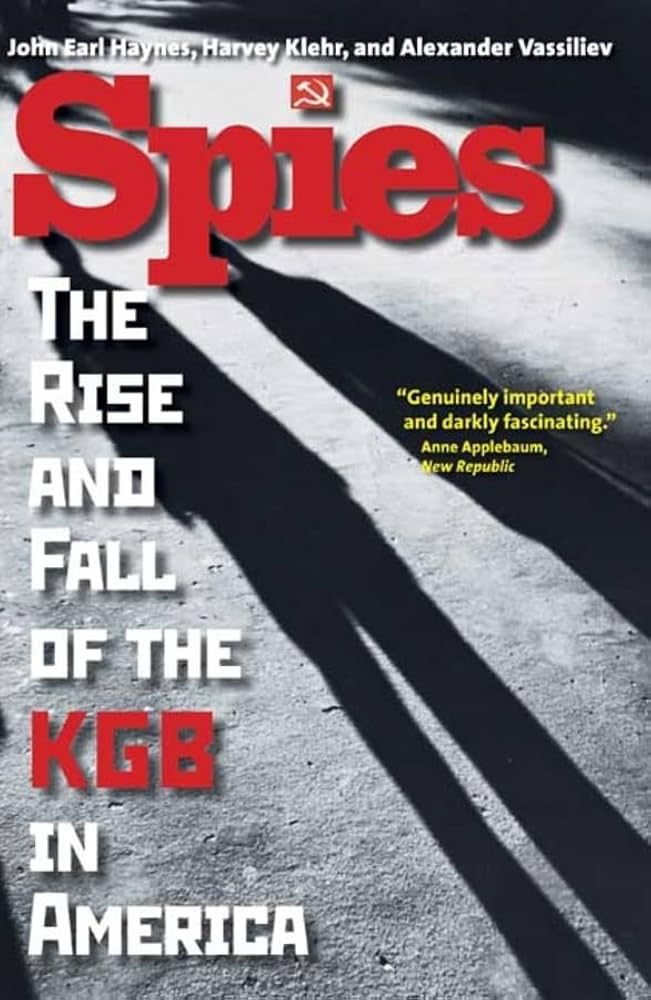
This book details the extensive espionage operations conducted by the KGB in the United States during the Cold War. Drawing from declassified Soviet archives, the book uncovers the scale of Soviet infiltration in U.S. institutions, including government agencies, scientific research facilities, and even Hollywood.
It details key cases, including those of Julius and Ethel Rosenberg, Alger Hiss, and Soviet moles in American intelligence services.
The book provides enough historical and contextual background to be useful for beginners as well, but offers deeper insights for those looking to expand their knowledge and understanding of Soviet / Russian intelligence operations.
Spies and Commissars: The Early Years of the Russian Revolution
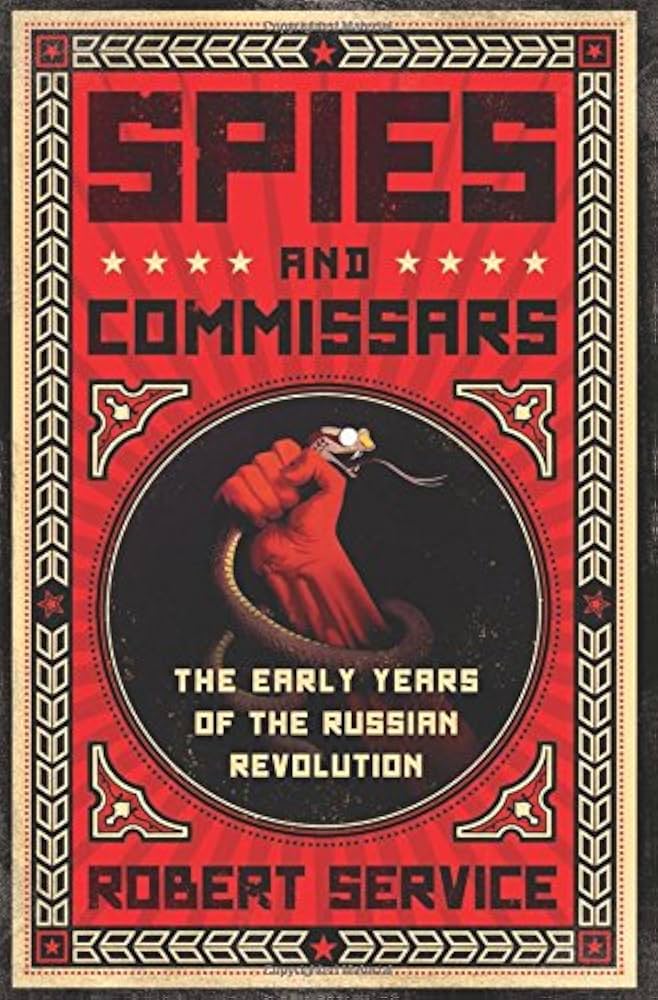
Spies and Commissars examines the period following the Russian Revolution, focusing on the role of Western intelligence agencies, Soviet spies, and foreign diplomats in shaping the early Soviet state.
Robert Service explores how Bolsheviks navigated foreign intrigue, how British and American spies attempted to counter Soviet influence, and how early Soviet intelligence operations helped consolidate Lenin’s power.
This book is an analytical analysis of a critical period in early Soviet history. It assumes familiarity with the Russian Revolution but offers a fresh perspective through the lens of espionage and international relations. The book’s focus on intelligence operations makes it particularly valuable for those interested in the origins of Soviet spying and global power struggles in the early 20th century.
Spies - The Epic Intelligence War Between East and West
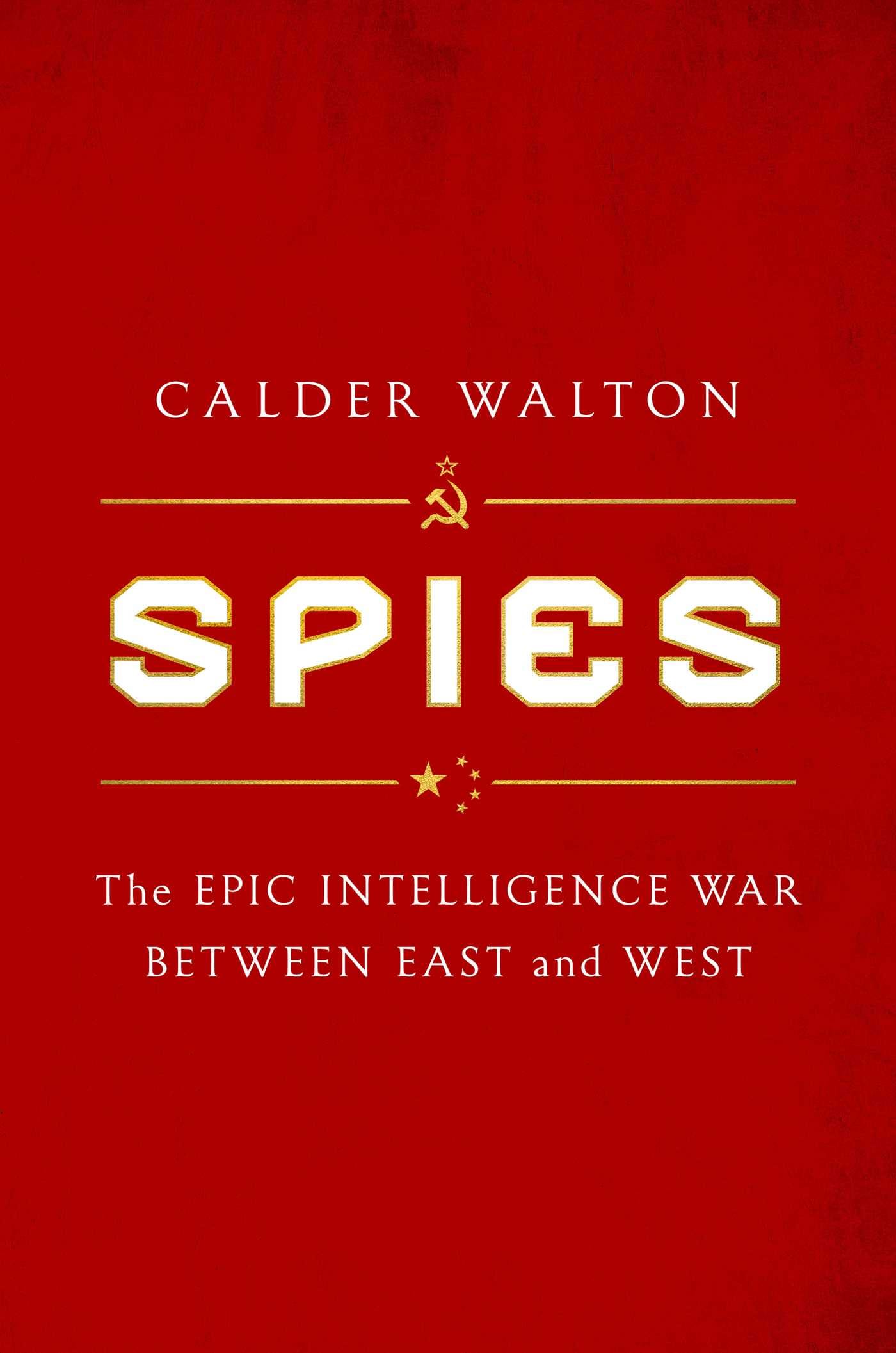
This book provides a history of the intelligence war between the Western democracies and the Soviet bloc, spanning the Cold War to modern times.
Calder Walton explores how espionage, counterintelligence, and covert operations shaped global conflicts, from Soviet infiltration of Western governments to the CIA’s countermeasures. He also examines how today’s intelligence struggles (such as cyber warfare and election interference) are direct continuations of Cold War tactics.
There's a lot of content in this book, but the writing style makes it so that said content feels a bit overwhelming at times. Not an easy one to get through, especially if you're new to the topic.
The World Was Going Our Way: The KGB and the Battle for the Third World
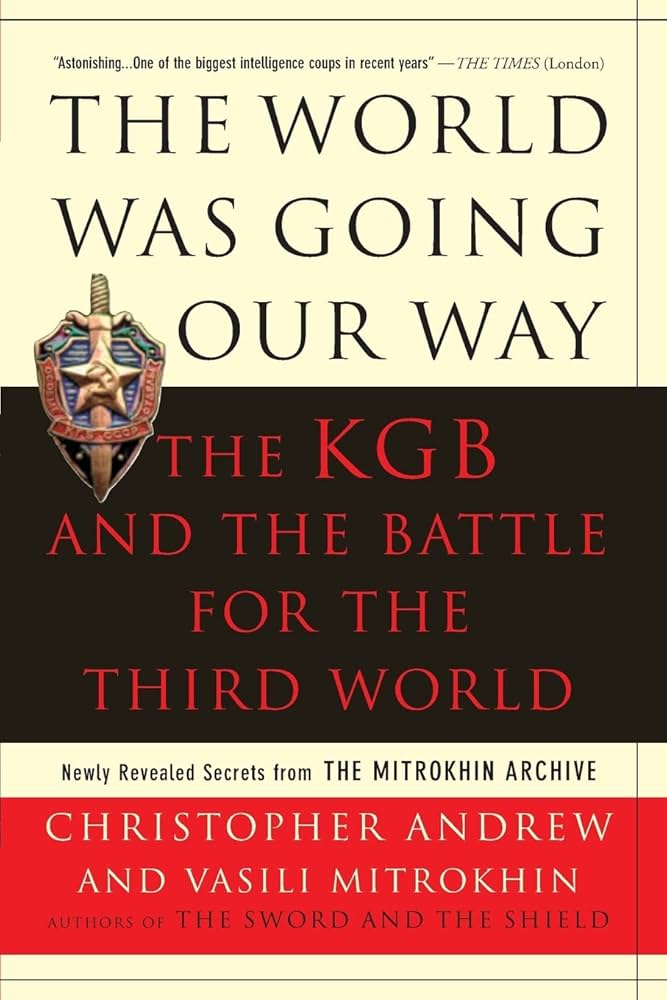
This is the second book based on the Mitrokhin Archives, looking at how the KGB attempted to spread Soviet influence in the Third World during the Cold War.
Christopher Andrew and Vasili Mitrokhin document KGB operations in Africa, Asia, and Latin America, showing how Soviet intelligence worked to destabilize pro-Western governments, support communist movements, and conduct covert influence campaigns.
The book provides a detailed look at Soviet foreign policy through the lens of intelligence operations and deals primarily with arenas and venues that aren't as well represented in popular books about the Cold War. Which means that you should have a basic understanding of the history of, for example, Latin America after World War II in order to fully appreciate what the authors are talking about.
Near and Distant Neighbors: A New History of Soviet Intelligence
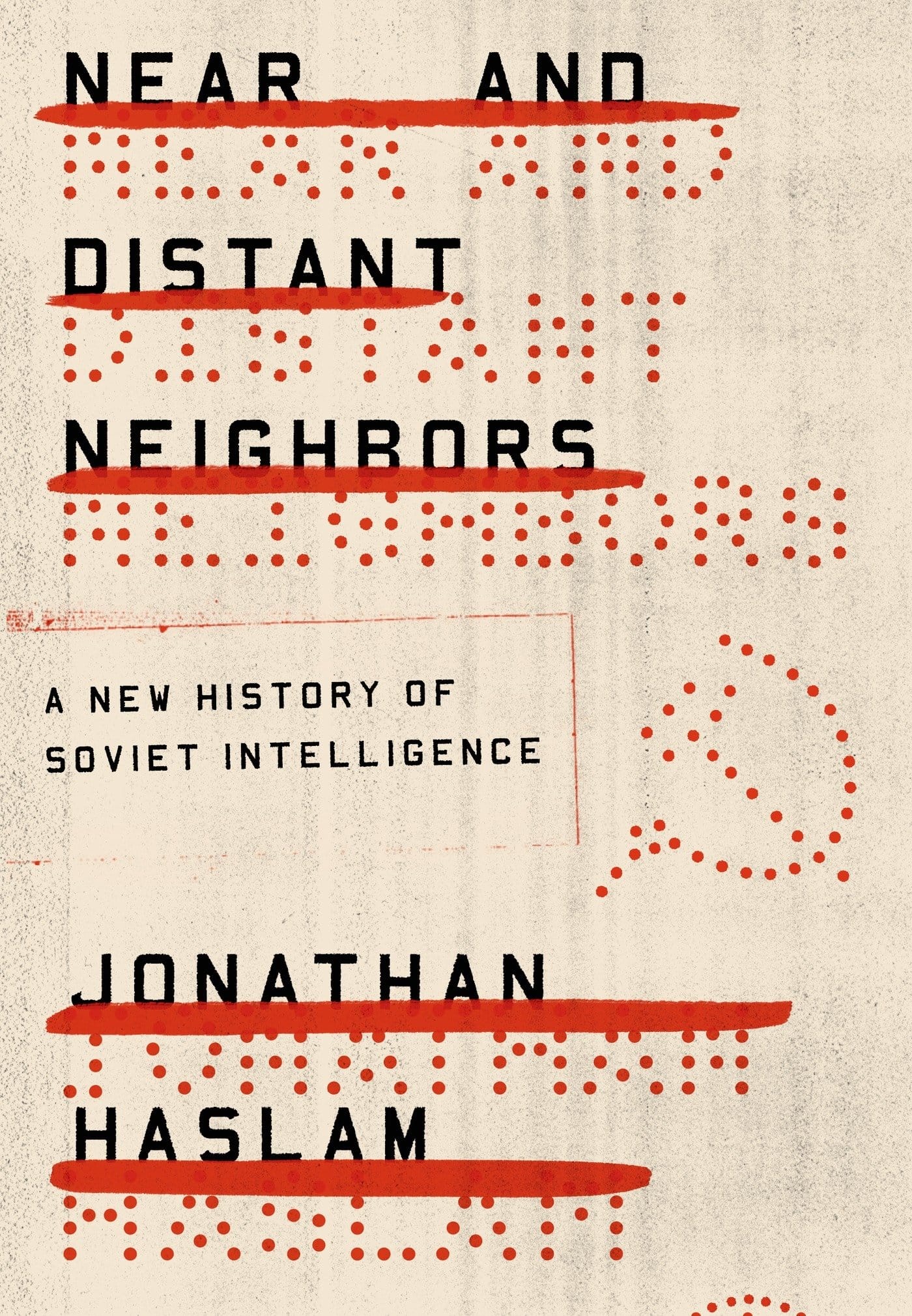
This book provides a comprehensive account of how the Soviet Union’s intelligence services shaped its domestic and international policies from the early revolutionary period to the Cold War’s conclusion.
Drawing on newly declassified documents and scholarly analysis, the author reveals the complex interplay between Soviet espionage, propaganda efforts, and shifting political landscapes at home and abroad. He illustrates how intelligence networks influenced everything from diplomatic relations to internal power struggles.
This book greatly helps with fostering a deeper understanding of Soviet-era espionage and the broader legacy of these agencies on Russia’s current strategic outlook.
Active Measures
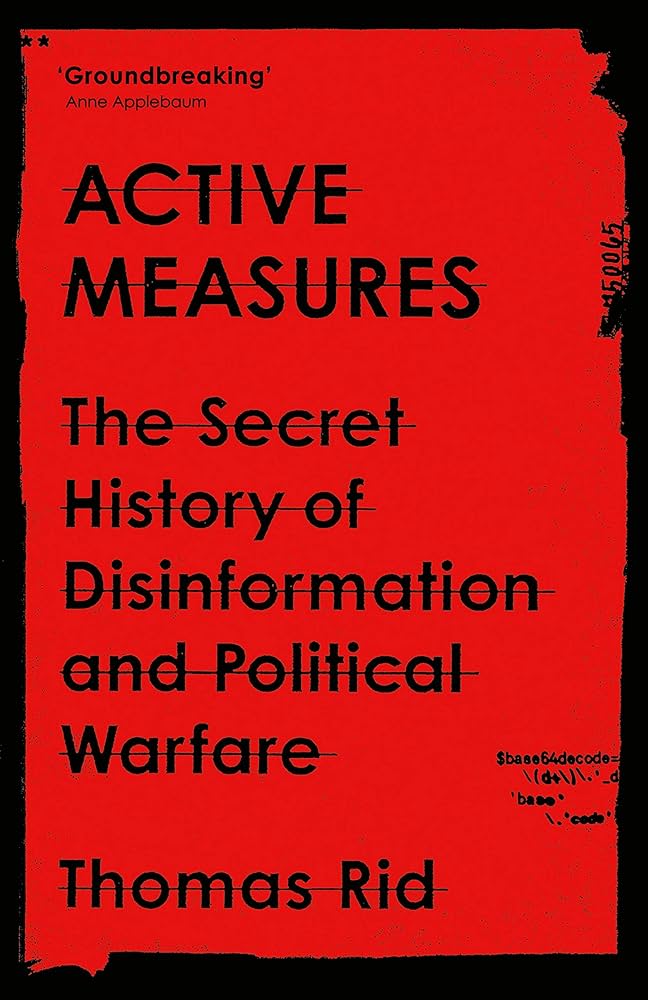
Active Measures explores the history of disinformation as a tool of political warfare, tracing its use from Soviet propaganda tactics to modern-day cyber campaigns. Thomas Rid examines how intelligence agencies manipulate information to influence elections, destabilize societies, and undermine rivals. He details historic cases of fake news, forged documents, and online misinformation, showing how these tactics evolved with new technology.
The book has a comparatively narrow focus and assumes that the reader is at least aware of the events that the authors are talking about. Without previous knowledge it's going to read more like a thriller rather than the analytical work it is.
The Compatriots: The Russian Exiles Who Fought Against the Kremlin—and Eventually Bowed to It
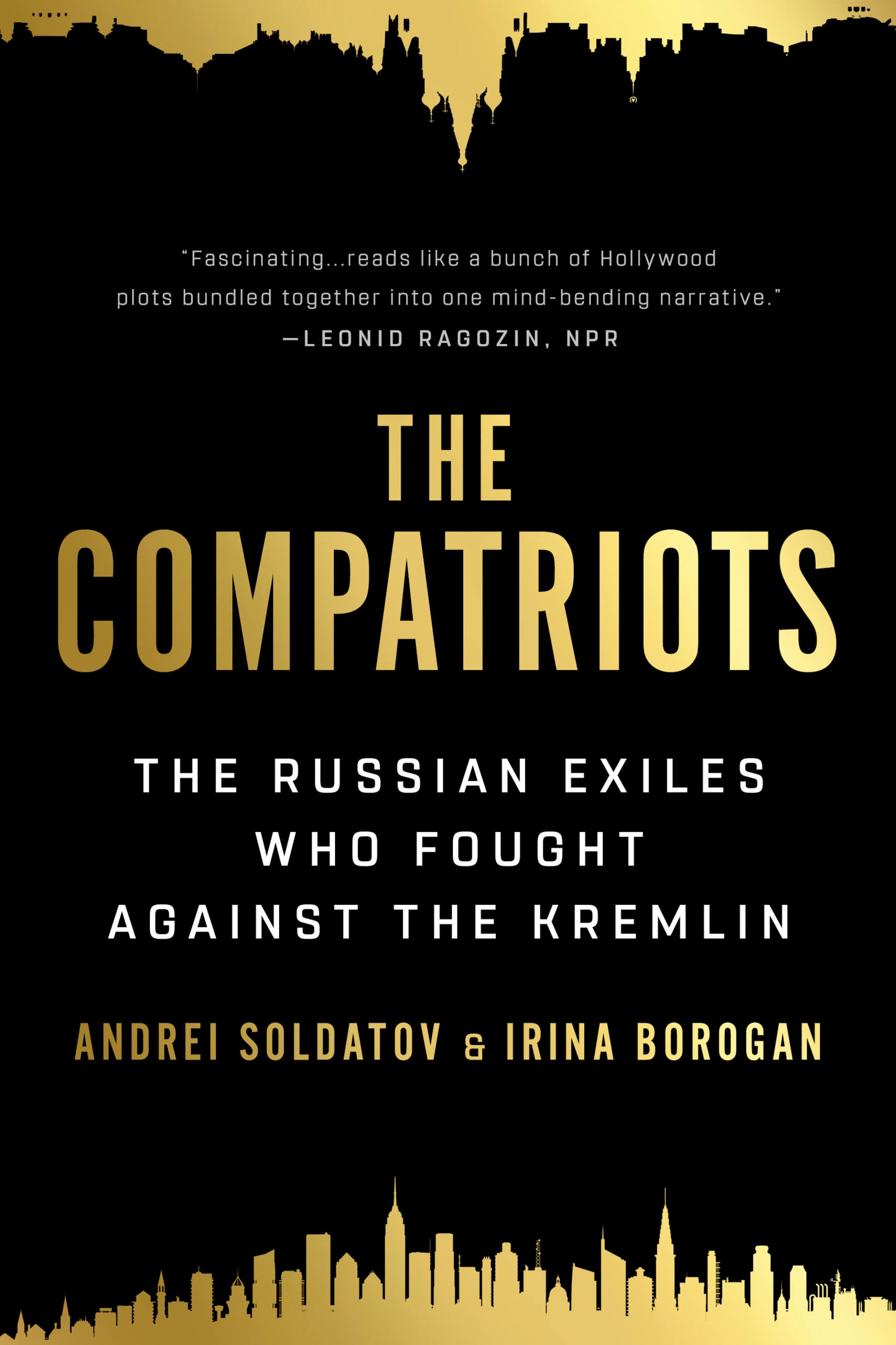
"The Compatriots" looks at the stories of Russians who left their homeland (more often than not under duress) and continued to challenge Moscow's power from abroad. From the beginning of the Soviet era to modern Russia under Putin, the authors spotlight notable figures who shaped public discourse, sparked political movements and / or became targets of state-sponsored surveillance and violence.
The book delves into espionage, media manipulation, and the ongoing struggle of exiles to maintain influence and stay safe while living outside Russia’s borders. All the while maintaining a critical view of everyone involved, not just the Soviet or Russian regime.
Deception: Spies, Lies and How Russia Dupes the West
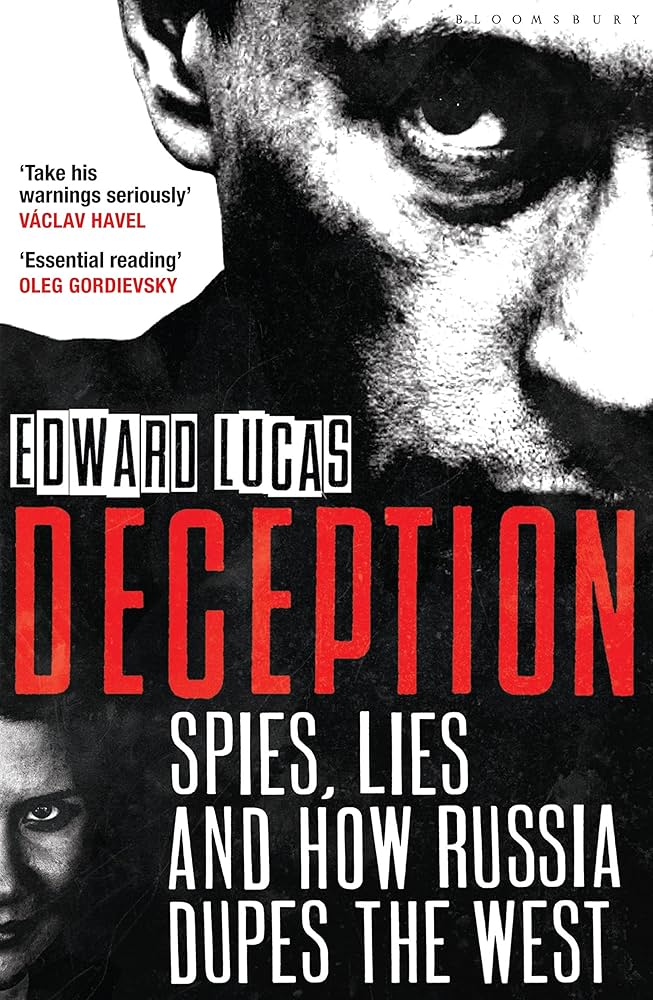
Edward Lucas examines how Russian intelligence continues to manipulate, deceive, and influence Western governments, businesses, and media.
He argues that the West has consistently underestimated Russian espionage efforts, allowing Moscow to conduct disinformation campaigns, cyberattacks, and political subversion with minimal resistance.
The book covers the history of Russian deception strategies and their effectiveness in modern times.
Stalin’s Secret War: Soviet Counterintelligence Against the Nazis, 1941–1945
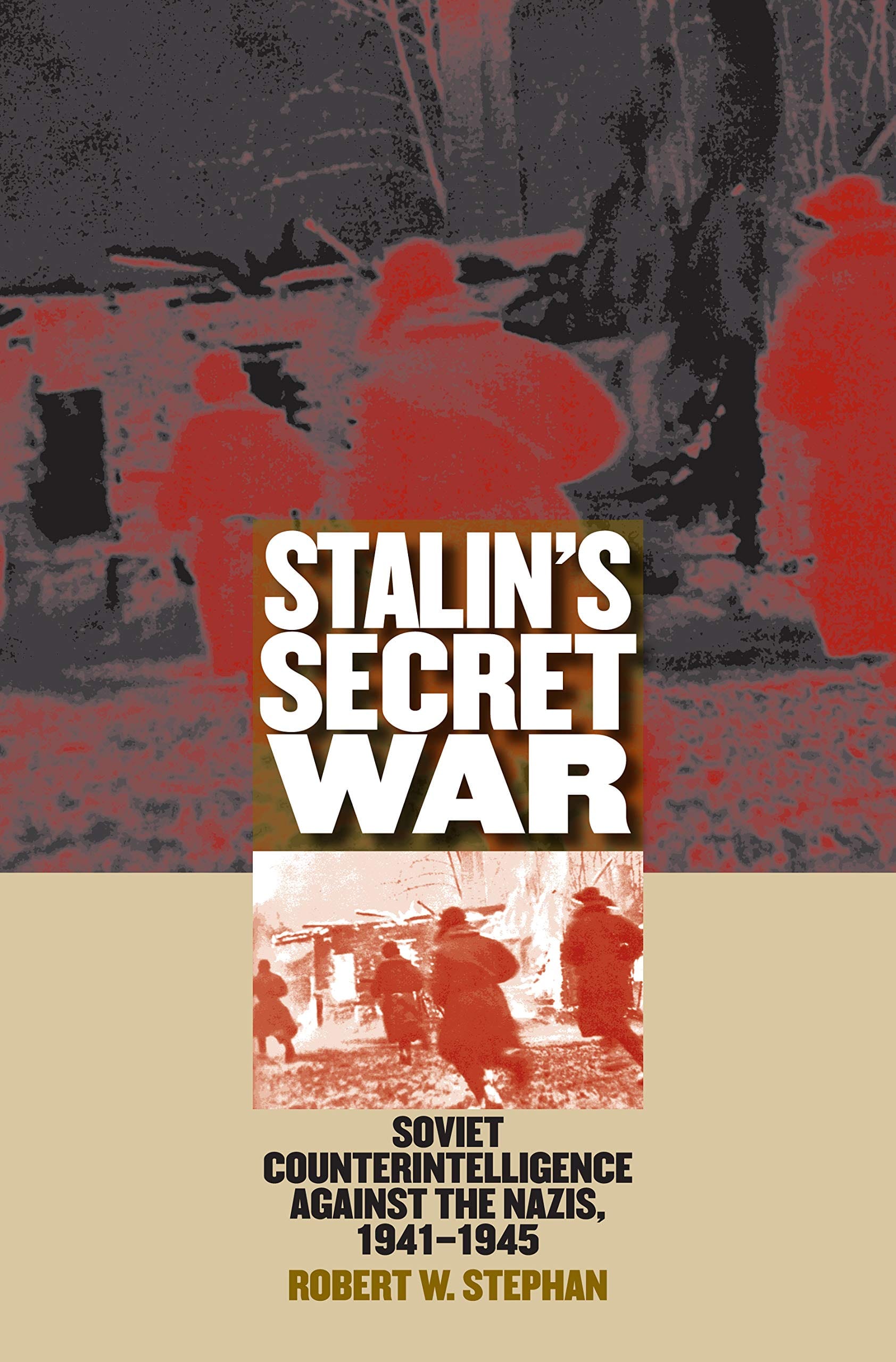
This book explores the role of Soviet counterintelligence (mainly by looking at SMERSH and the NKVD) in defeating Nazi Germany during World War II.
Robert W. Stephan details how Stalin’s security services identified and eliminated German spies, launched deception operations, and ensured internal control over the Red Army. The book sheds light on lesser-known aspects of Soviet intelligence efforts, including double agents, misinformation campaigns, and brutal purges of suspected traitors.
The book goes into Soviet intelligence efforts during World War II in great detail without bothering to provide much explanation for the historical context they happened in. If you think "sounds like a nice dish" when hearing "Prokhorovka", then you need to do more reading on World War II before plowing through this book.
What Stalin Knew: The Enigma of Barbarossa

This book examines the question of why Stalin ignored multiple intelligence warnings about Hitler’s impending invasion of the Soviet Union in June 1941.
David E. Murphy, a former CIA officer, analyzes Soviet intelligence reports, intercepted German communications, and Stalin’s decision-making process in the months leading up to Operation Barbarossa.
The book argues that Stalin’s deep distrust of his own intelligence services, combined with his ideological convictions and belief that Hitler would not attack so soon, led to catastrophic miscalculations that left the Soviet Union vulnerable to the initial German onslaught.
The book provides a mix of espionage history, military analysis, and political decision-making analysis. If you go into it with an understanding of the Russian military and intelligence services of today you are going to notice that some things very much stayed the same.
Advanced
The Russian FSB - A Concise History of the Federal Security Service
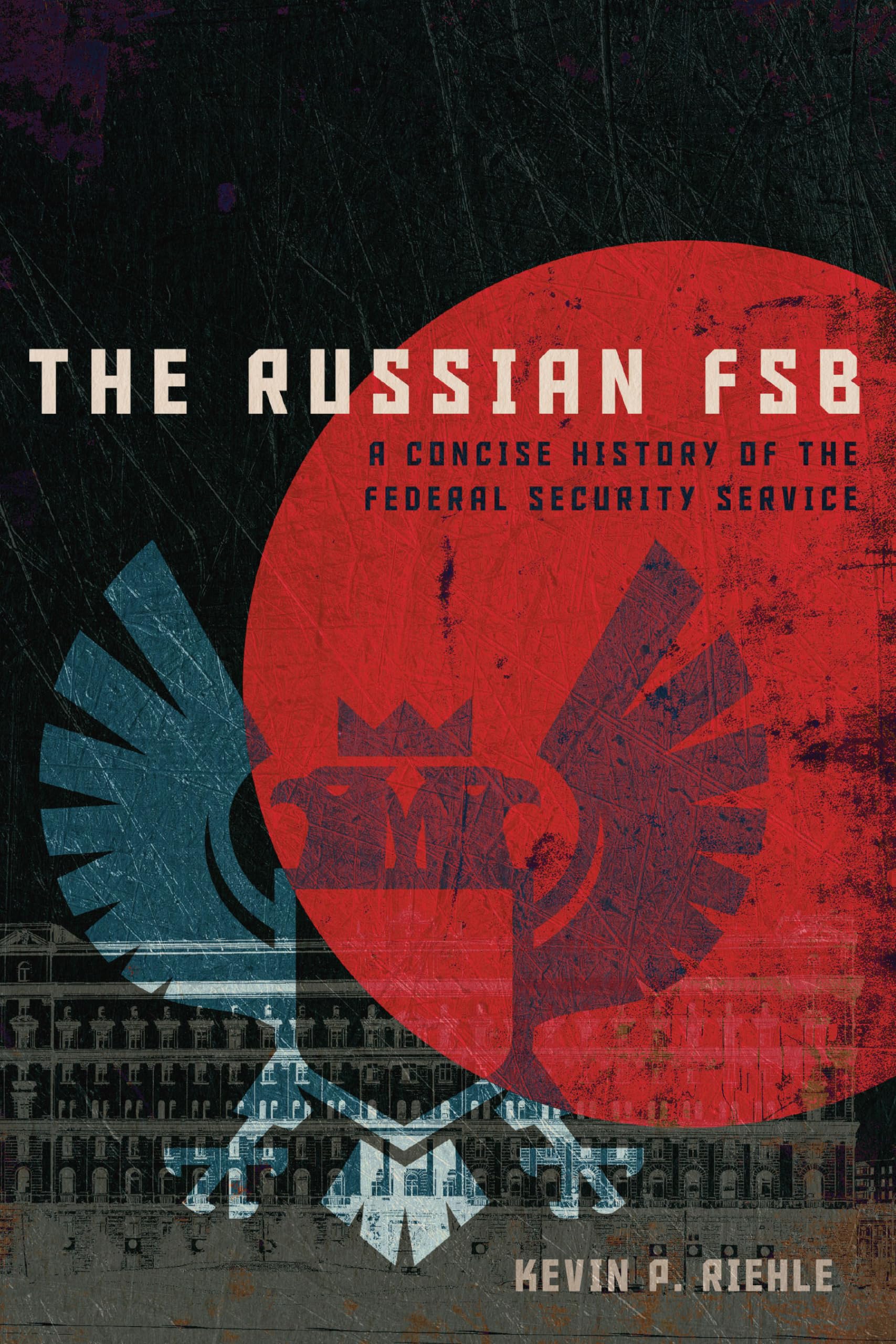
This book is what happens when you take an org-chart, add some internal documentation and organizational lore, and turn it into a book. It traces the evolution of Russia’s main domestic security and intelligence agency from its early roots in the Soviet secret police to its present-day role.
The author sheds light on the FSB’s structure, culture, and shifting mission over time, offering a rare glimpse into an often opaque organization. It might be a bit dry at times, because it is at times pretty much nothing more than a detailed org-chart, but this book offers a detailed look into an organization that has shaped and continues to shape the Russian political and social landscape to a great extent.
Russian Information Warfare: Assault on Democracies in the Cyber Wild West
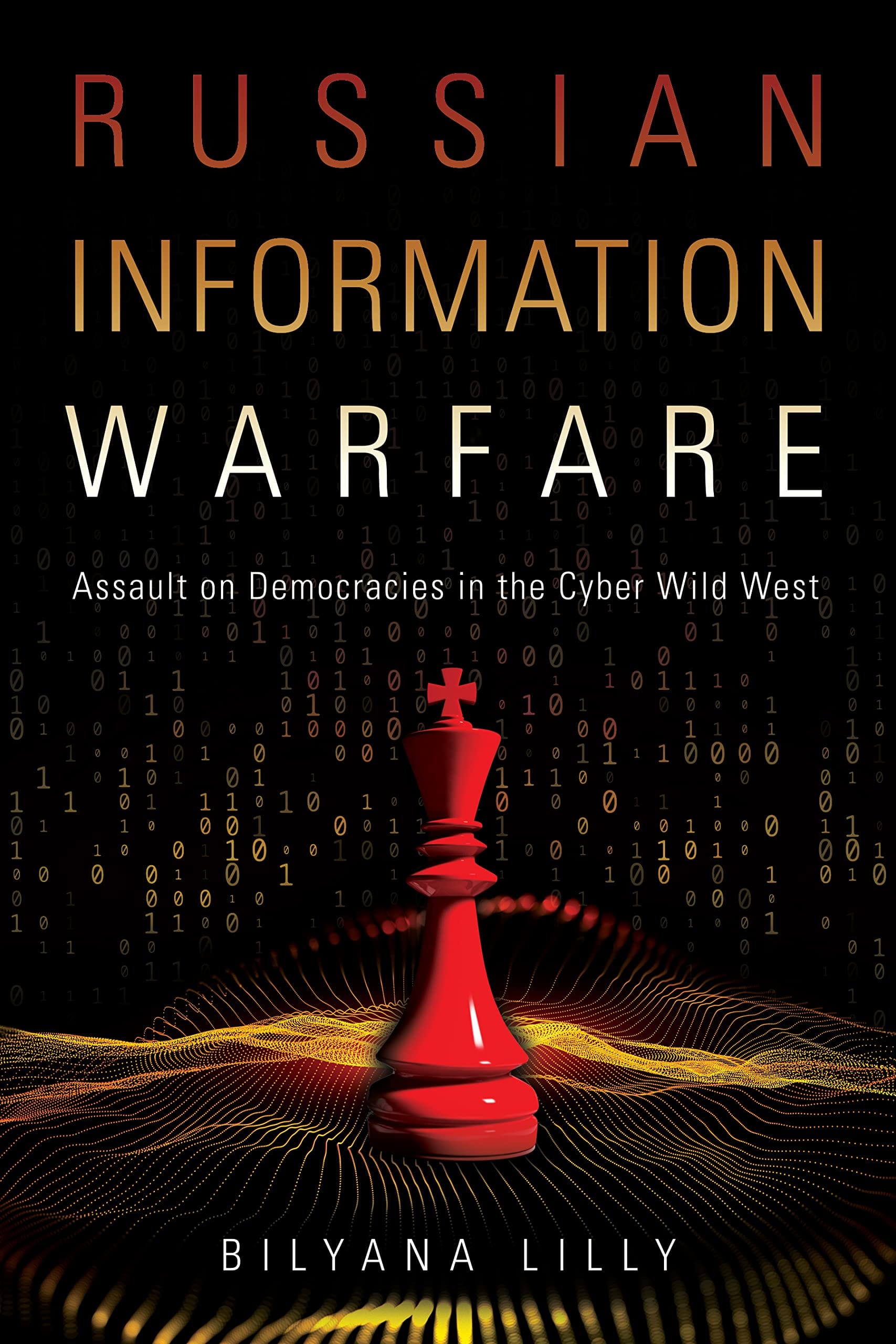
This book explores how the Kremlin exploits digital tools, disinformation, and strategic hacking to challenge and undermine democratic systems worldwide.
Drawing on case studies and expert research, Bilyana Lilly reveals how these operations fit into Russia’s broader doctrine of warfare, blurring the lines between peace and conflict. The author delves into high-profile cyberattacks, social media manipulation and other, constantly evolving tactics used by Russian threat actors.
Russian Intelligence - A Case-based Study of Russian Services and Missions Past and Present
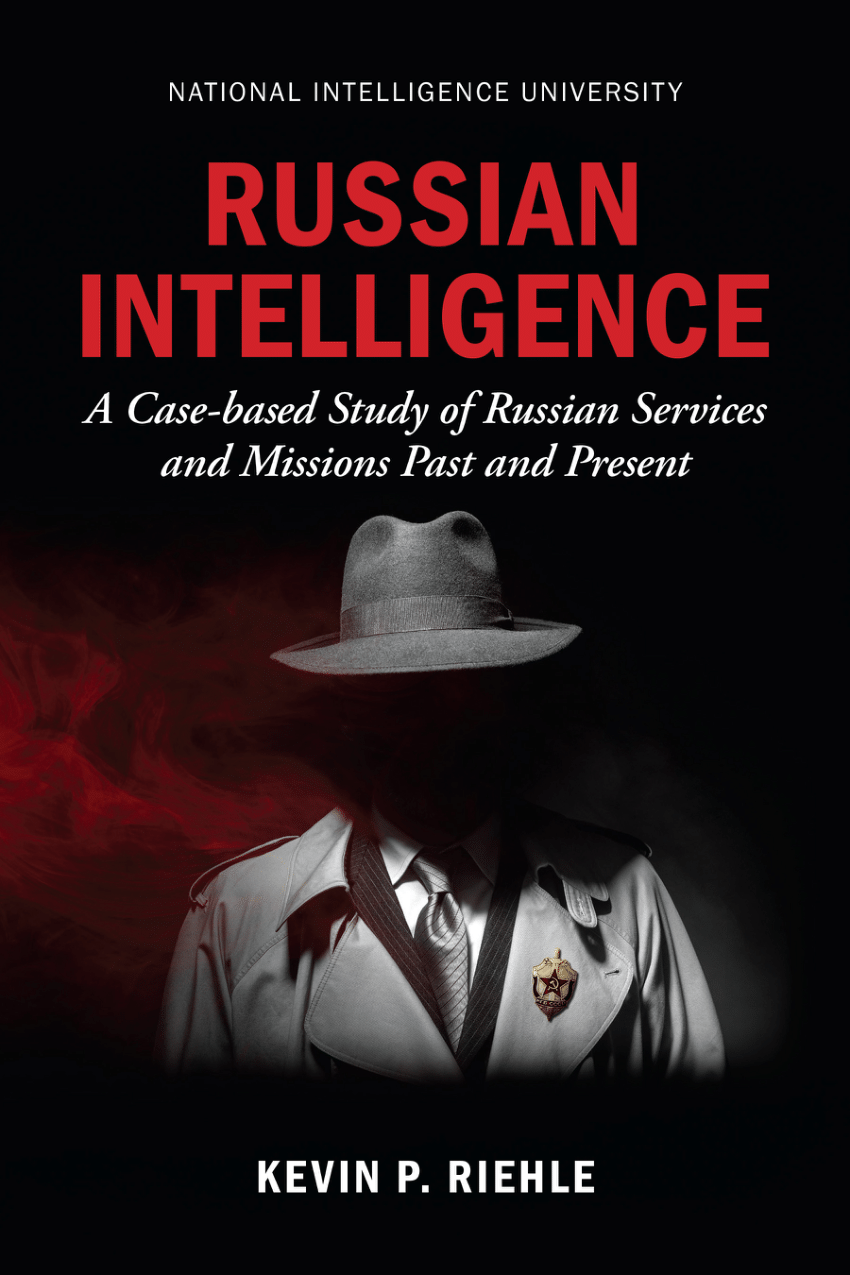
This book takes a close look at how Russia’s intelligence agencies have evolved over time and how they conduct their operations. By highlighting both historical context and modern-day practices, it sheds light on the enduring methods and motivations of Russia’s espionage activities.
Drawing on specific case studies (from Soviet-era plots to contemporary incidents) the author reveals patterns in recruitment, tradecraft, and political objectives, offering a window into the complex web of state security in Russia.